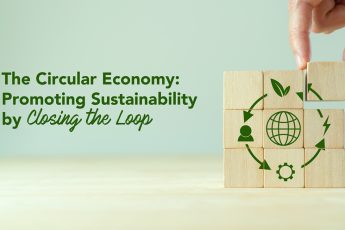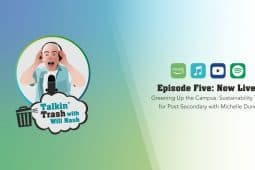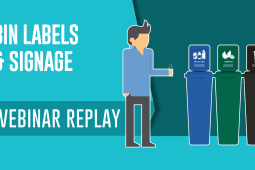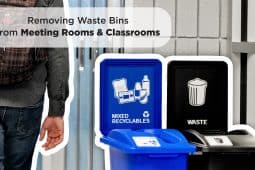In wake of The Seattle City Council passing a new ordinance on Monday that could mean $1 fines for people who toss too many table scraps into the trash, we take a look at the successes and pitfalls of implementing programs of this nature. This begs the question, which way is better for incentivizing people to recycle more, the carrot, the stick, both, or something else?
“In the issue of motivation — specifically the “carrot and stick” aspect — new research seems to indicate that brain chemicals may control behaviour and for people to learn and adapt in the world, both punishment and reward may be necessary.”¹
This new research suggests that extrinsic reward (financial compensation, job promotion etc.) or punishment is necessary to influence long-term learning and change. However, contradicting evidence from multiple sources, such as author Daniel Pink’s novel Drive, suggests that “extrinsic motivators work only in a surprisingly narrow band of circumstances.”¹
These studies suggest that it’s actually quite the opposite, stating that only extrinsically rewarding individuals actually inhibits motivation and performance over time and that it’s the more intrinsic values—such as doing something meaningful—that produce the best long-term results.
So what does this mean for recycling and the ultimate goal of zero waste?
Motivating businesses, organizations, households and individuals to recycle—and recycle properly—has been an lasting challenge for those with the goal of eliminating the need for landfills and achieving full sustainability.
Sweden—arguably the leader in the sustainability race with a waste diversion rate of 99%–has taken the approach of marketing their recycling system using a combination of intrinsic and extrinsic motivation. Their aggressive recycling campaigns place heavy emphasis on prevention, reuse, recycling and the controversial recycling alternatives. However, the country also has a number of strict recycling policies that prompt individual fines and increased waste collection rates in the neighbourhood for improper recycling.
Sweden’s approach rewards individuals intrinsically by proving how meaningful their efforts are to achieving sustainability. This is done quite well by heavily publicising recycling numbers and the positive effects the program has had on the environment. This methodology not only provides individuals with that sense of doing something meaningful, but its success has also brought on an incredible amount of publicity and national pride.
The key element of Sweden’s campaign is the numbers and proof that back up their efforts. In the waste disposal and recycling industry there is a lot of noise and contradicting evidence suggesting one way over the other. This noise and contradictory evidence creates a lot of confusion for individuals and organizations on whether or not what they’re doing is actually meaningful. By providing all the evidence in a public and transparent fashion, Sweden has quieted this confusion and gained considerable support.
All that said, Sweden’s success hasn’t come without issues and controversy. Sweden’s success has come at a large cost of building an efficient, privatized infrastructure to back their waste diversion system. This has led to a heavier hand in extrinsic punishment for the individuals and business in Sweden and rising costs of waste collection.
Recycling in Sweden is becoming less confusing regarding proper disposal (i.e putting the correct item in the correct recycling bin), but more complicated in that each item must be disposed of more appropriately (i.e washing or compounding before being placed in the correct recycling container). Failure in doing so is now leading to increasing fees, court cases—believe it or not—, salaried recycling spies—believe it or not—and therefore a more dissatisfied community.
All of these negative repercussions are wearing down the intrinsic value of doing something meaningful for individuals and are provoking them to ask the question, is it really meaningful?
The City of Seattle’s recycling rate is steadily improving—up to 56% in 2013—which is a great number speaking comparatively against the entire nation’s recycling rate of approximately 34.5%. That being said, their goal is to be above 60% by 2015, which at their current growth rate would not be met.
Implementing the $1 fine for improper recycling is Seattle’s approach to boost recycling rates in their city to meet their 2015 goal, meaning they have decided to go by the way of the “stick”—punishment for improper recycling. Granted, the city has already declared that it does not intend to collect many fines, but whether or not Seattle matches its punishments with a widespread campaign to provide information on the value of recycling, or financial reward for proper recycling—a nice big metaphorical “carrot”—is yet to be seen.
What Seattle and the rest of us can take from the situation in Sweden is that a proper balance between punishment and positive intrinsic and/or extrinsic motivation is needed to move towards a zero waste environment. Punishment will always be needed for certain individuals and the sense of doing something meaningful is something everyone needs to feel a part of the solution.
Straying too far towards the “stick” without the “carrot” will eventually inhibit motivation and create backlash, as we may see shortly in Sweden. And wandering towards specifically extrinsic motivation without intrinsic motivation may eventually leave everyone feeling a little empty.
Recycling is a complex issue, but we’re now starting to see many examples of organizations, municipalities, cities and countries starting to figure out what is and isn’t the proper tactic for increasing recycling rates. The key is learning from past successes and pitfalls and using that information to do it right the next time. If we can do this, zero waste and full sustainability is surely within our grasp.








